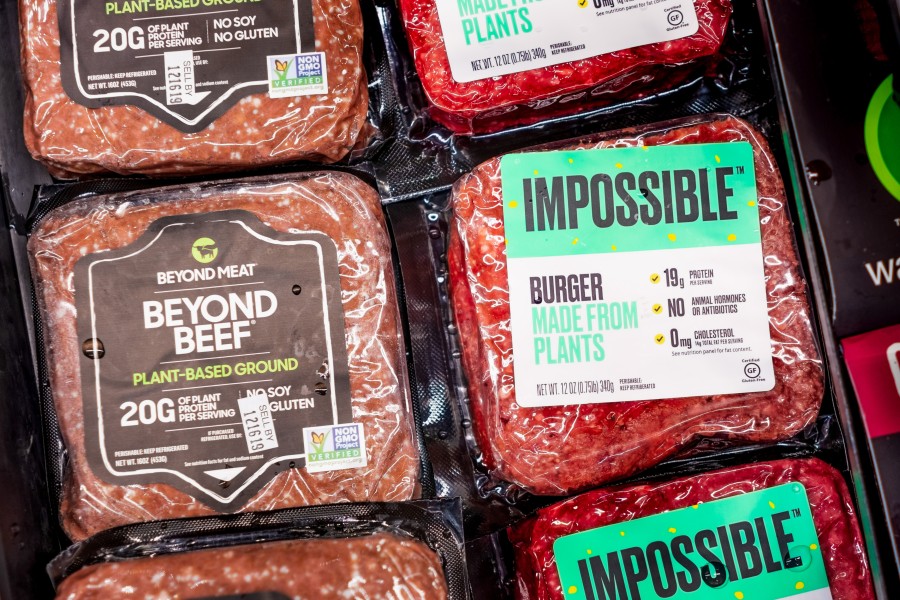
- Industry news
Industry news
- Category news
Category news
- Reports
- Key trends
- Multimedia
- Journal
- Events
- Suppliers
- Home
- Industry news
Industry news
- Category news
Category news
- Reports
- Key trends
- Multimedia
- Events
- Suppliers
Fi Europe 2025: Plant-based innovation shifts focus to texture and nutrition
Key takeaways
- Fi Europe 2025 spotlights next-generation plant-based and alternative proteins, with ingredient suppliers showcasing systems that enhance nutrition, texture, sustainability, and clean label performance.
- We talk to ADM, Cargill, and Ajinomoto Foods Europe ahead of the trade show in Paris next week.
- Hybrid and plant-forward innovation gains momentum, driven by flexitarian consumers seeking better sensory quality, higher protein content, and more sustainable food options.

The initial wave of innovation emanating from the plant-based space has declined somewhat since early adopters in the industry. The sector has been evolving over the last decade, coming a long way since it was initially pegged as a niche segment aimed at vegans and vegetarians, with a wave of animal-free mimicking products, such as alternative sausages, burgers, and nuggets. But now it’s so much more as F&B innovators up their game with a diverse range of alternative, sustainable protein sources, while developing products that go far beyond mimicking meat and dairy.
Increasing concerns about sustainability, animal welfare, and climate impact are shaping long-term category momentum, while innovators are pushing the needle on taste and texture.
Fi Europe 2025, starting next week in Paris, is shaping up to be a hotbed for plant-based and alternative protein innovation, with an expected strong showing from ingredient companies with protein systems targeting nutrition, texture, sustainability, and clean label.
Food Ingredients First speaks with key players — Ajinomoto Foods Europe, ADM, and Cargill — about the latest consumer trends and market dynamics driving the space, and examines some of the plant-based innovations making an appearance at Fi Europe 2025.
ADM will showcase several solutions that support improved sensory performance, nutritional value, and clean label targets in plant-based and alternative protein innovation. Its culinary tasting sessions and interactive demos leverage the extensive portfolio of clean-tasting, highly functional protein solutions to create culinary-forward, high-protein concepts reflecting flavor and ingredient trends.
“Our newly launched European-sourced soy protein concentrate, Tradcon SE, is designed to meet the needs of consumers who enjoy both plant and animal proteins, while prioritizing affordability and convenience,” says Bastian Hörmann, global marketing director, Sweet Goods, Dairy & Specialized Nutrition, at ADM.
Tradcon SE is a functional soy protein concentrate that delivers high-quality nutrition with outstanding water and fat binding capabilities, salt stability, clean taste, and a neutral color.”
The product provides low cost-in-use, protein content of over 68%, high fiber, and a complete amino acid profile. Produced in Europe from non-GMO soy, Tradcon SE performs well across a wide range of applications, including emulsified meat systems such as frankfurters, cold cuts, canned meat products, pasteurized sausages, and ground meat systems like burgers and nuggets.
“Tradcon SE is featured at Fi Europe in concepts such as our ‘Blended Burger’ and ‘Extended Chicken Hot Dog,’ providing examples of how the solution helps reduce reliance on meat while still meeting high expectations for quality, taste, and texture.”
“We’re also spotlighting our high-quality TVP, Soprotex-N Slices, along with our textured soy protein concentrate Tradcon T 171, in our innovative ‘Plant-based Chicken Drumstick’ concept. Elevated with our chicken-type flavor from our savory flavor portfolio, the concept delivers an authentic dark meat chicken taste. Additionally, the long fibers of European-sourced Soprotex-N slices provide a chicken-like, whole-muscle texture. Tradcon T 171 adds a delicate flaky texture and ensures a firm bite, and the addition of an emulsion provides the signature juiciness, setting this drumstick apart,” Hörmann notes.
 Consumers are seeking more plant-based products such as Beyond Meat's ground beef.
Consumers are seeking more plant-based products such as Beyond Meat's ground beef.
Plant-based growth
Aysegul Ozcan, enhanced nutrition commercial marketing director at Cargill, says that while early growth rates have moderated, the plant-based category continues to expand, particularly in segments where products meet or exceed consumer expectations in terms of sensory experience and value.
“The future of this market depends on continued improvements in taste, texture, and affordability. Cost remains a key barrier, alongside the need for scalable supply chains for novel proteins. At Cargill, we address these challenges by combining our deep ingredient expertise with advancements in fermentation, protein optimization, and texturizing systems, helping our customers to deliver products that consumers love,” she says.
“We see consumers not necessarily moving away from animal protein altogether, but rather diversifying their diets. The modern consumer seems to be motivated by health, sustainability, and curiosity for new food experiences. This shift has brought flexitarianism into the mainstream and encouraged F&B brands to explore hybrid and plant-forward innovations.”
“The most successful launches today are those that deliver on taste, texture, nutrition, and affordability — key purchase drivers that are expected to determine the long-term success of new protein solutions.”
Ingredient innovation and processing technologies
Cargill offers a portfolio to meet evolving consumer needs and market demands across various formats, including burgers, sausages, and meatballs, whether plant-based, hybrid, or plant-forward.
Its partnership with Enough has led to Abunda mycoprotein coming to market — an ingredient consisting of a biomass produced via fermentation that is naturally rich in protein and fiber. Abunda offers a meat-like texture ideal for whole-muscle applications such as Thai-style patties, dumplings, or fish alternatives.
“We have also expanded our RadiPure pea protein line, optimized for great solubility, viscosity control, and flavor neutrality, making it well-suited for drinkable yogurts, bars, and powdered beverages. In parallel, our WavePure seaweed powder enhances mouthfeel, and SimPure starches provide label-friendly texturizing solutions,” Ozcan continues.
 Dairy alternatives like almond or oat milk are gaining traction as some consumers look to reduce their intake of animal-derived products.
Dairy alternatives like almond or oat milk are gaining traction as some consumers look to reduce their intake of animal-derived products.
Alternative dairy
Ajinomoto Foods Europe’s Activa DA, a blend of three enzymes to improve the structure and functionality of plant-based, semi-hard cheeses, has been shortlisted as a finalist for Fi Europe’s Dairy Alternative Innovation Award.
Activa DA is formulated to improve firmness, elasticity, and sliceability in cold applications, enhance melt behavior and stretch after heating, and support more authentic cheese performance in plant-based products. It is particularly useful for applications like pizzas and gratins, according to the company.
The product was developed as a blend of three enzymes to improve the structure and functionality of plant-based, semi-hard cheeses.
“Texture remains a key challenge in plant-based cheese. Activa DA specifically addresses this issue in both cold applications and after heating. This unique blend of three enzymes is designed to increase the texture of plant-based semi-hard cheeses. Leveraging Ajinomoto’s expertise, we developed this technology to improve shredability, making industrial processes such as producing grated cheese more efficient,” Alice Rebours, marketing manager, Solutions & Ingredients Division, at Ajinomoto Foods Europe, tells Food Ingredients First.
Additionally, Activa DA enhances the stretchability and meltability of the cheese when heated.
“Unlike other structuring or binding technologies used in plant-based dairy, Activa DA combines transglutaminase with two additional enzymes. This multi-enzyme approach improves several texture attributes simultaneously. Importantly, the nutritional value and labeling of the final product, such as hard cheese, remain unchanged when using our solution.”
“We expect a significant growth in the hybrid product category, including hybrid cheeses (combining animal and plant proteins), hybrid meat, and hybrid milk. This trend is driven by the market’s demand for products with higher protein content to support healthier lifestyles. We are confident that our upcoming enzyme innovations will help address texture challenges in these products, delivering improved quality and consumer satisfaction.”











